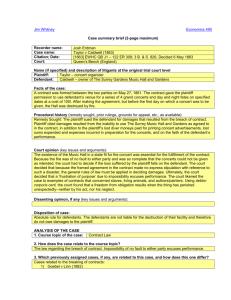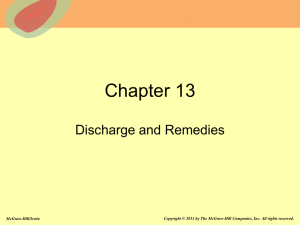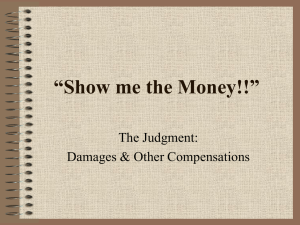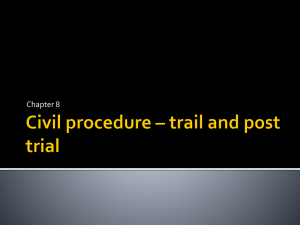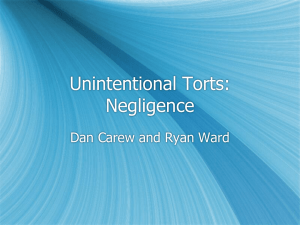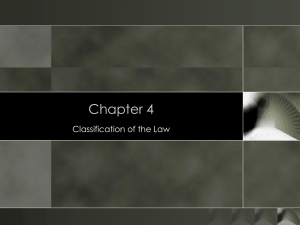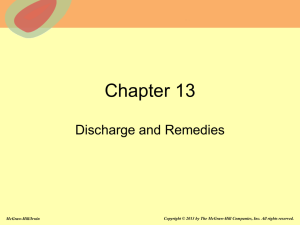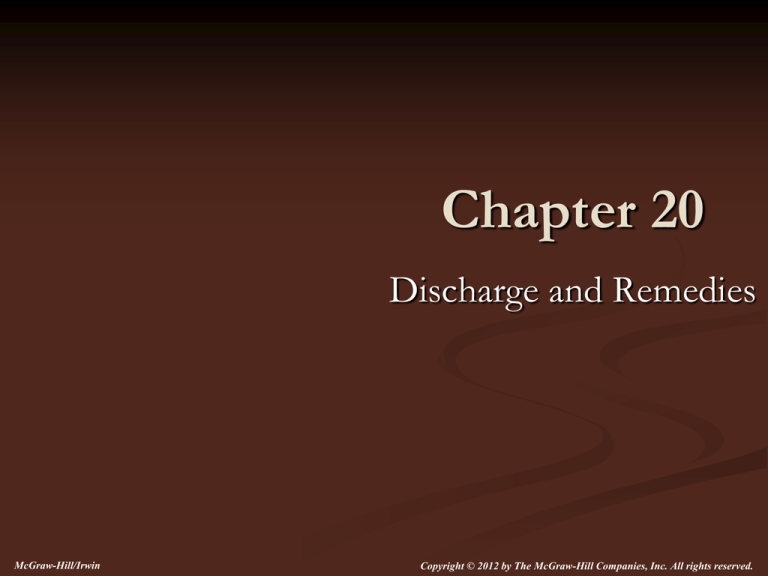
Chapter 20
Discharge and Remedies
McGraw-Hill/Irwin
Copyright © 2012 by The McGraw-Hill Companies, Inc. All rights reserved.
Circumstances Resulting in Discharge of Contract
Occurrence or non-occurrence of a condition
Complete or substantial performance
Material breach: Occurs when party unjustifiably fails to
substantially perform his obligations under contract
Mutual Agreement
Operation of law
20-2
Types of Conditions
Condition Precedent: Particular event that must occur for a party’s duty to
arise
Condition Subsequent: Future event that terminates obligations of parties
when it occurs
Concurrent Conditions: Each party’s performance conditioned on
simultaneous performance of the other
Express Condition: Condition explicitly state in contract (usually preceded by
words such as “conditioned on”, “if”, “provided that”, or “when”)
Implied Condition: Condition not explicitly stated, but inferred from nature
and language of contract
20-3
Types of Performance
Complete Performance: Occurs when all aspects of parties’
duties under contract are carried out perfectly
Substantial Performance: Occurs when:
Completion of “nearly all” terms of agreement;
Honest effort to complete all terms; and
No “willful departure” from terms of agreement
20-4
Anticipatory Repudiation
Definition: Party decides, before the actual time of performance, not to
complete contract obligations
Often occurs when market conditions change and one party realizes it will not
be profitable to fulfill terms of contract
Can occur either through express indication of intent, or action inconsistent
with intent to fulfill contract when performance due
Once contract anticipatorily repudiated, non-breaching party discharged from
obligations under contract, and can sue immediately for breach
20-5
Discharge By Mutual Agreement
Mutual Rescission: Both parties agree to discharge each other from their mutual obligations
Substituted Contract: Parties agree to substitute new contract in place of original contract
Accord and Satisfaction: Used when one party wishes to substitute a different performance for his
original contractual duty
“Accord”: Promise to perform new duty
“Satisfaction”: Actual performance of new duty
Party’s duty under contract not discharged until new duty performed
Novation: Parties to contract wish to replace one of the parties with a third party
“Novation” is the substitution of a party
Original duties remain same under contract, but one party discharged, and third party takes
original party’s place
All three parties must agree to the novation for it to be valid
20-6
Discharge By Operation of Law
Alteration of Contract
Bankruptcy
Tolling of statute of limitations
Impossibility of performance
Commercial Impracticability
Frustration of Purpose
20-7
Legal Remedies (Monetary Damages) For Breach of Contract
Compensatory Damages: Damages designed to put plaintiff in position he would have been in
had contract been fully performed
Consequential (Special) Damages: Foreseeable damages that result from special facts and
circumstances arising outside contract itself. These damages must be within contemplation of
parties at time breach occurs
Punitive Damages: Damages designed to punish defendant and deter him and others from
engaging in similar behavior in the future
Primary factor in determining amount of punitive damages is amount necessary to “punish”
defendant
Amount of punitive damages depends on factors such as wealth and income of defendant
Nominal Damages: Award (typically for only $1 or $5) intended to signify that although no actual
damages resulted from defendant’s breach of contract, plaintiff wronged by defendant
Liquidated Damages: Damages for breach of contract specified in the contract itself (either as
fixed amount, or as formula for determining money due)
20-8
Duty to Mitigate Damages
(Definition):
Obligation on non-breaching party (plaintiff)
to use reasonable efforts to minimize
damage resulting from defendant’s breach of
contract
20-9
Equitable Remedies (Court-Ordered Action) For Breach of
Contract
Rescission: Termination of contract
Restitution: Return of any property transferred under contract
Specific Performance (Specific Enforcement): Order requiring breaching party to
fulfill obligations under contract. Usually awarded only when monetary damages
inadequate, and subject matter of contract unique (Example: Contract for sale of real
estate)
Injunction: Order forcing person to do something, or prohibiting person from doing
something (usually a prohibition against certain actions)
Reformation: Contract rewritten to reflect parties’ actual agreement
Quasi-Contract: “Contract-like” obligation imposed on party to prevent “unjust
enrichment”
20-10
Elements Necessary to Recognize Quasi-Contractual
Recovery
Plaintiff conferred benefit on defendant
Plaintiff reasonably expected to be compensated for benefit
conferred on defendant
Defendant would be “unjustly enriched” from receiving benefit
without compensating plaintiff
20-11
Exhibit 20-4: Things To Consider Before Filing Suit:
Likelihood of success
Desire/need to maintain ongoing relationship with potential
defendant
Possibility of getting better/faster resolution through alternative
dispute resolution (ADR)
Cost of litigation/ADR compared to value of likely remedy
20-12

